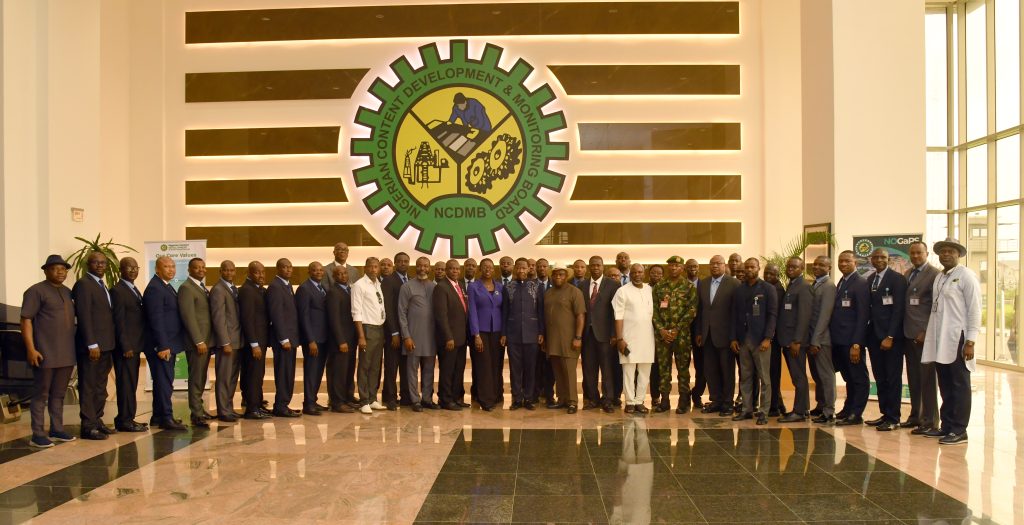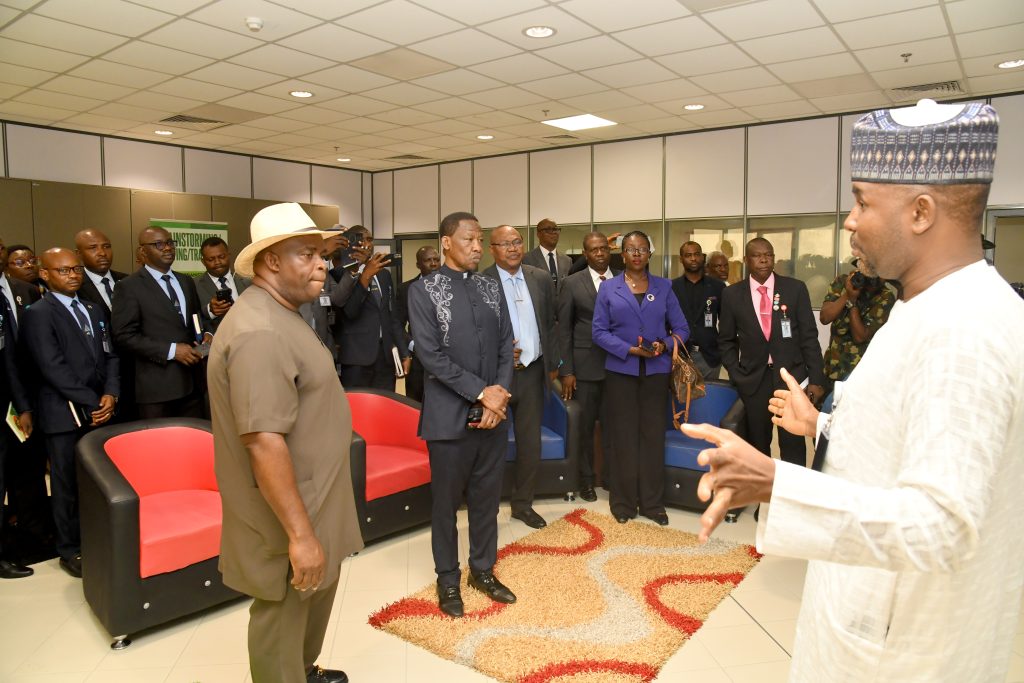OIL AND GAS
NCDMB Hosts Nigerian Army Personnel, Showcases Milestones in Local Content Implementation
NCDMB Hosts Nigerian Army Personnel, Showcases Milestones in Local Content Implementation
AJAGBE ADEYEMI TESLIM
SPONSORED BY: H&H
The Nigerian Content Development and Monitoring Board (NCDMB) on Thursday in Yenagoa, Bayelsa State, played host to a visiting team of ranking military officers from the Nigerian Army Resource Centre (NARC), Abuja, who are in the state on a local study tour.

At an interactive session at the Nigerian Content Tower (NCT), corporate headquarters of the NCDMB, the Executive Secretary of the Board, Engr. Felix Omatsola Ogbe, presented a portrait of Nigeria’s oil and gas industry in its first 50 years of operation and the highpoints in implementation of the Nigerian Oil and Gas Industry Content Development (NOGICD) Act, 2010.
According to him, the earlier phase was marked by capital flight amounting to an estimated US$380 billion, loss of two million jobs as a result of human capital deficits, and less than five per cent in local content. In sharp contrast is the post-NOGICD Act era which has witnessed phenomenal development of in-country capacity and capabilities as a result of creative enforcement and monitoring of industry operations as well as strategic interventions by the NCDMB.
The NCDMB boss explained that local content hit 56 per cent at the end of 2023, which translates into in-country retention of 56 per cent of oil and gas industry yearly spend on operations – a feat that has made the NOGICD Act as well as implementation strategies the model for other oil- and gas-producing countries in Africa.
The target for the NCDMB, he pointed out, is 70 per cent in 2027.
With emphasis he declared that the NCDMB wants to ensure that equipment and tools as well as services required for oil and gas operations are made and procured in Nigeria.
In accounting for the success of the Board thus far and the feasibility of its performance targets in capacity development, he said, “We take research and development seriously,” citing the centres of excellence established, equipped and funded by the Board in the six universities, one in the six geopolitical zones of the country.

The Executive Secretary, who was represented by the Director, Corporate Services and Capacity Building, Dr Ama Ikuru, observed that the Nigerian Army itself has raised the bar in research and development as well as local content, in relation to human capital development and local manufacturing of some components used in military operations.
While conducting the guests, which comprised officers between the ranks of Lieutenant Colonel and General currently undergoing an 11-month Leadership and Strategic Course 3/2024, round different sections and facilities of the Board, Dr Ikuru had the team familiarised with the Board’s Technology Innovation and Incubation Centre (TIIC).
its success story in aiding individuals with innovative ideas and facilitating technology adaptation and process improvement was highlighted.
In further elaboration of the Board’s activities and engagements, the Director, Monitoring and Evaluation, Alhaji Abdulmalik Halilu, noted that there is a history of “mutually beneficial partnership between the Army and the NCDMB,” citing the involvement of the Board’s personnel as resource persons at the Nigerian Defence Academy, Kaduna.
According to him, “It is good the military sees NCDMB as a partner.”
In his own remarks, the General Manager, Corporate Communications and Zonal Coordination, Barr. Esueme Dan Kikile, said the visit of the military officers who are Participants of the Leadership and Strategic Course 3/2024 from the NARC, afforded the Board and guests a useful platform for interaction and knowledge sharing. He urged the guests to “tell the success story of the NCDMB” wherever they find themselves”.
Team leader for the military officers, Major General Abubakar A. Tarfa (retd), explained that the Local Study Tour was part of an 11-month course and that members of the team were all professionals in diverse fields – engineering, medicine, nursing, and administration, among others.
He said the course was designed “To prepare participants for higher responsibilities” and that the tour would provide necessary exposure, to have the officers acquainted with the NCDMB and its role and monitoring programmes that “ensure steady growth in local content” in the oil and gas industry.
Major General Tarfa pointed out that there is “a relationship between leadership, strategy and national security,” and that the training and associated activities underline such realities.
He said “military assistance to civil authority for oil production in the Niger Delta toward national development” was a major motivating factor in their study tour of the state.
Speaking on behalf of participants, Lt. Col. Juliet Aziekwu expressed appreciation for the interactive session, stating, “We are better informed about the NCDMB and its role; we’ll put the knowledge into use.”
Earlier in opening remarks, the Deputy Manager, Corporate Communications and Zonal Coordination, Dr. Obinna Ezeobi, had noted that there was a nexus between what the military officers were in the state to do and what the NCDMB does, that is, capacity building. He said they were thus in the right place.
On the entourage of the NARC team was the Commander of the 16th Brigade of the Nigerian Army, Yenagoa, Brigadier General Oluremi Obolo.
